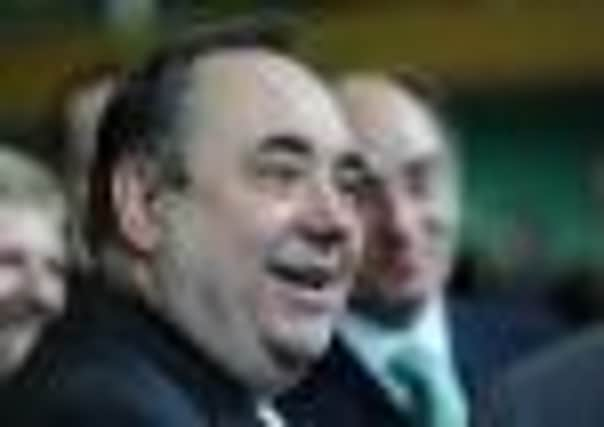Scottish independence: Alex Salmond says his push for a Yes vote will begin this May


The First Minister said campaigning would begin soon after local elections on 3 May and following the end of the Scottish Government’s consultation on the referendum on the future of the Union.
The SNP leader promised an independence campaign with a “positive approach” that he said would “contrast very markedly with our opponents, who are united only in their negativity”.
Advertisement
Hide AdAdvertisement
Hide AdBut Mr Salmond was accused of attempting to deliver a “loaded” referendum question to boost support for an independent Scotland after he claimed pro-independence would be the “Yes” campaign in the referendum.
The First Minister said the SNP would be part of a “broad-based campaign with civic Scotland” and the support of business leaders and trade unions to “enunciate the case for independence”.
He said: “So confident are we about winning the referendum, that shortly after the local elections in Scotland in May and the final position on the Scottish Government’s consultation – which I think is 11 May – then the Yes campaign will be launched.
“It will be a broad-based campaign with civic Scotland, with the job creators of Scotland, with the unions of Scotland, a variety of people coming together to enunciate the case for independence.
“And that positive approach is going to contrast very markedly with our opponents, who are united only in their negativity.”
The First Minister went on to say that if an independent Scotland used the sterling currency, “there would have to be a fiscal stability pact” with the UK limits on borrowing.
Mr Salmond said: “Let’s say your stability pact said over the long term your borrowing shouldn’t exceed 3 per cent of GDP … I would argue that’s no more than the fiscal discipline a sensible country would have in any case.”
Conservative MSP Murdo Fraser insisted that the question on the ballot paper should ask whether voters want to “keep Scotland in Britain”, as he called for the independent Electoral Commission to be handed a key role in setting the question.
Advertisement
Hide AdAdvertisement
Hide AdMr Fraser said: “It’s completely presumptuous for Alex Salmond to talk about a Yes campaign for independence when the question that will be put has not even been agreed.
“There is no doubt that the SNP wants to set a loaded question in an attempt to deliver a higher vote for separation. That’s why having the Electoral Commission involved is so important.”
Labour MSP Patricia Ferguson also attacked Mr Salmond’s announcement yesterday, as she claimed “there is no agreement on the wording of the question”, after the SNP published its preferred option of “Do you agree that Scotland should be an independent country?”
A spokesman for Mr Salmond said there was a “precedent” for the move, and pointed out that the 1997 referendum on establishing a Scottish Parliament had asked voters two Yes or No questions on whether they wanted devolution and tax-raising powers for MSPs.
The spokesman said that the First Minister had opted for a lengthy campaign in the run-up to the referendum to allow Scots to “take a proper amount of time” to decide on whether to back independence.
Meanwhile, Scottish Secretary Michael Moore yesterday said he backed more powers for Holyrood whatever the outcome of the referendum.
He said: “We [the Liberal Democrats] as a party have long argued that. But the thing is we do that by consensus.
“We need to work with others to get that consensus and then we deliver it.”
Advertisement
Hide AdAdvertisement
Hide AdMr Moore said that he did not believe the question of extra powers should appear as a choice on the referendum ballot paper, as he called for a straight Yes or No question.
He said: “I think people want more powers – I absolutely agree with that, and as a Liberal Democrat I want to see that over time.
“But quite separate to that, I think most people want the central issue resolved – are we staying in the United Kingdom or not? That requires a single question that resolves that issue decisively.
“Then we can resolve what those extra powers will look like.
“We don’t need the referendum to give us permission to have the debate to deliver those new powers – that argument is already under way.”
Prime Minister David Cameron has already promised to look at strengthening Holyrood if Scotland voted against independence.
However, he has declined to say how much power he is prepared to transfer to Edinburgh, arguing that the independence question has to be answered before such details are sorted out.
However, the Nationalists want the devo-plus option – which would see Holyrood take control of most taxes – included on the referendum ballot paper as an alternative to full independence.